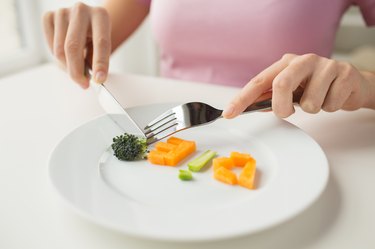
You may be motivated to drop a few pounds, but your body cares more about survival than weight loss. It's actually driven to maintain stores of fat because they're the back-up source of energy just in case you go into starvation mode. And that's exactly what happens if you go too low with calories -- your body thinks it's starving, so it slows down metabolism to keep you alive.
Slow Metabolism from Reduced Calories
Video of the Day
When you go on a low-calorie diet, the brain slows down metabolism to conserve energy and keep the body functioning on fewer calories. The extent of the slowdown depends on how severely you cut calories, the foods you eat, and other factors such as whether you exercise and your general health. When calories drop too low, your body goes into what's commonly called starvation mode, but healthcare professionals call it adaptive thermogenesis. In other words, the body adjusts the number of calories it burns based on loss of calories consumed.
Video of the Day
It goes without saying that adaptive thermogenesis makes it harder to lose weight, but here's a shocker -- after you lose weight, your metabolism may stay sluggish. After losing weight, total energy expenditure -- or calories burned -- remained at 15 percent less than the amount of energy used before weight loss, according to a review of studies published in the International Journal of Obesity in October 2010. This is one reason why it's so hard to keep weight off. But there are some steps you can take to minimize or prevent this problem.
Healthy Calorie Goals Sustain Metabolism
The best way to lose weight -- and prevent massive metabolism slowdown -- is to get enough calories to support your heart, brain and other life-supporting functions. Everyone needs 1,200 to 1,400 calories daily to support these basic metabolic needs. You're on a low-calorie diet if you get fewer than 1,200 calories. The National Heart, Lung and Blood Institute recommends a weight-loss diet of 1,200 to 1,500 calories daily for women, while men should lose weight by consuming 1,500 to 1,800 calories per day.
A healthy eating plan that provides at least 1,200 calories daily fits with advice to lose weight at a gradual pace of 1 to 2 pounds weekly. Consuming 3,500 calories less than you burn drops 1 pound, so if you consistently eat 500 fewer calories every day, you'll lose a pound every week. Most people can shave 500 calories from their daily diet and still get at least 1,200 calories.
Dropping below 1,000 calories daily has the same effect as starvation. Don't attempt to follow a very low-calorie diet -- 800 calories daily or less -- unless a physician monitors your diet and nutritional status.
Diet Plan to Optimize Weight Loss
You've probably debated which diet works the best, whether low-carb, low-fat, or the latest fad diet. In reality, the best diet is the one that works for you, says Eric Rimm, Sc.D. at the Harvard School of Public Health. Creating a diet plan you can stick with is the most important factor, because that determines your success. Of course, it also has to provide optimal nutrients and support metabolism, but you can tailor the mix of macronutrients to fit your needs.
Guidelines from the Institute of Medicine say to get 45 to 65 percent of your daily calories from carbohydrates, 20 to 35 percent from fats, and 10 to 35 percent from proteins. When most people lose weight, they lose some muscle along with stored fat. You can minimize muscle loss by getting plenty of protein because it triggers muscle synthesis, so aim for the higher end of 35 percent of daily calories.
Be sure to get at least 130 grams of carbs so you have enough energy to fuel metabolism. Fill your carb intake with whole grains, beans and vegetables. Choose unsaturated fats -- olive oil and other vegetable oils, nuts and avocados -- and eat lean protein. Fish is great for essential omega-3 fatty acids, but other good choices include skinless poultry and cuts of lean meat, such as round, tenderloin and 95 percent lean ground beef. If you follow a vegetarian diet, go with beans, peas, lentils, soybeans, tofu, quinoa, nuts and seeds for protein.
Exercise Offsets Slowing Metabolism
When you limit calories enough to slow down metabolism, the energy normally used for physical activity also loses steam. You'll offset some of this lethargy with realistic calorie goals and a balanced diet, but you may need to put some extra planning into staying active. As you exercise, you'll boost metabolism, which helps prevent a slowdown from becoming your normal status. Try to include strength training in your regimen by lifting weights or using resistance bands. This type of exercise builds muscle while you're trying to lose weight.
If you have an aversion to exercise, choose an activity you love. Whether you enjoy walking the dog, dancing, swimming or cycling, or want to join the local volleyball team, find something you can do and create a schedule that lets you do it for 30 minutes at least five days each week. In addition to keeping your metabolism purring, you'll lose more weight when you combine exercise with eating fewer calories.